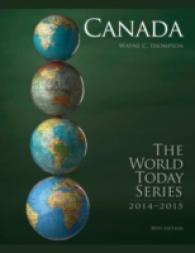- ホーム
- > 洋書
- > 英文書
- > Business / Economics
Full Description
Singapore's progress as an independent nation and the uplifting of its people's livelihood have been made possible by stable social and political conditions. A more important factor in driving these positive changes lies with people-centric leadership. One can contrast the case of Singapore with societies led by self-serving leaders whose lack of honesty and integrity brings about immense social and economic hardships to various communities. When people suffer under undesirable circumstances, they often migrate to seek better future for themselves and their families.This book reveals how Singapore's governance grounded on the principle of asset building facilitates the country's growth and development. Policies being discussed in this volume include multi-culturalism, accessible housing, social mobility for low-income families, water resource management, and national conscription.Highly relevant for students, policy makers and the general public interested in socio-political and economic development issues, this unique piece of work not only gives readers a documentary account of what has been undertaken to empower and assist citizens in the last 50 years or so, but also prompts them to reflect on Singapore's future trajectory.Related Link(s)
Contents
About the Contributors; List of Tables; List of Figures; Abbreviations; Acknowledgements; Introduction (S Vasoo and Bilveer Singh); Challenges in Asset Building in Singapore (Michael Sherraden); Investments for Social Sector to Tackle Some Key Social Issues (S Vasoo); Singapore's Multiculturalism: An Asset for Nation Building (Norshahril Saat); Political Innovations and Stabilisers as Strategic Assets in Singapore (Bilveer Singh); Housing as Asset Building in Singapore (Hongbo Jia and S Vasoo); Asset-Building Challenges with Low-Income Families (Irene Y H Ng); Water Policies as Assets (Yishu Zhou and Ching Leong); Conscription and Its Contribution to Singapore (Bernard F W Loo); Conclusion (S Vasoo and Bilveer Singh); Select Bibliography; Index;








